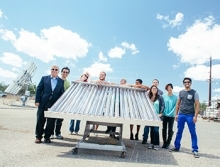MERCED, Calif. — Research into sustainable water supplies and viable solar energy solutions won the University of California, Merced, an anticipated $5 million in prestigious and competitive grants from the University of California.
UC Multicampus Research Programs and Initiatives (MRPI) awards will go to Professors Roger Bales and Roland Winstonand colleagues, who will oversee two of only 18 projects to be funded throughout the UC system out of 186 proposals. The grants begin Jan. 1, and award details will be determined then.
“These awards recognize the leadership our faculty members bring to these important topics,” Vice Chancellor for Research and Economic Development Sam Traina said.
 Bales, director of the Sierra Nevada Research Institute, proposed an intercampus UC Water Security and Sustainability Research Initiative, amalgamating experts from across the UC system to build a strategic base of water knowledge to help California and the nation achieve a water-secure future.
Bales, director of the Sierra Nevada Research Institute, proposed an intercampus UC Water Security and Sustainability Research Initiative, amalgamating experts from across the UC system to build a strategic base of water knowledge to help California and the nation achieve a water-secure future.
Winston, director of the nine-campus University of California Advanced Solar Technologies Institute (UC Solar), applied for renewal of the grant that helped fund the formation of the institute. UC Solar brings together the best solar scientists in the UC system to engage with energy stakeholders worldwide and develop solutions that can be brought to the marketplace quickly and integrated seamlessly.
“Solar is our most abundant and reliable form of renewable energy, and, when used effectively, has the potential to meet most, if not all, of our energy needs,” Winston said. “This grant renewal reflects UC’s ongoing leadership in solar energy research and education for California and the world.”
 Bales and Winston are both founding faculty members at UC Merced. Bales is with the School of Engineering, while Winston is with both the School of Engineering and the School of Natural Sciences.
Bales and Winston are both founding faculty members at UC Merced. Bales is with the School of Engineering, while Winston is with both the School of Engineering and the School of Natural Sciences.
The 2014 MRPI awards drew 186 eligible applications totaling more than $273 million in funding requests. The UC Office of the President said this highly selective program funds less than 10 percent of the proposals, which came from all 10 campuses and the Lawrence Berkeley National Laboratory.
The 18 funded proposals total more than $23 million over four years.
MRPIs are multicampus or systemwide research collaborations that advance outstanding research and cutting-edge discoveries, affect the lives of Californians, increase UC’s competitiveness, inform public policy and support innovative graduate student research.
When it comes to sustainability and renewable energy, California leads the nation. And UC Solar is leading California in developing solar energy generation technologies and designing and demonstrating innovative devices and systems that more efficiently and affordably convert sunlight to electricity, thermal energy and solar fuels.
With the continuation of the MRPI, Winston plans to continue the work UC Solar has done locally and around the globe, while also facilitating solar-energy system integration at the residential, community and utility levels. UC Solar will also examine solar energy economics and policy to help plan for the future of renewable energy sources in California.
A sustainable future also prompted Bales’ proposal. Unprecedented climate change, population growth and changing land cover are radically altering the water cycle, Bales said in his proposal, with dramatic impacts on human and environmental uses of water.
“As California grapples with a multi-year drought, the need for water security is clear,” he said. “Now is an ideal time for UC to establish this research initiative alongside California’s water leaders.”
The initiative blends UC’s technical advances in hydrology with parallel innovations in policy analysis and decision support to meet the state’s water-security challenges. Three primary concentrations will occupy the new initiative: relevant, real-time water data; a better understanding of land cover changes on source-water areas; and better tools and techniques for better groundwater management, including scientific and engineering developments and legal and policy research.
Both Bales and Winston aim to build public- and private-sector partnerships that will make their multicampus programs long-term, sustained initiatives within the UC.



